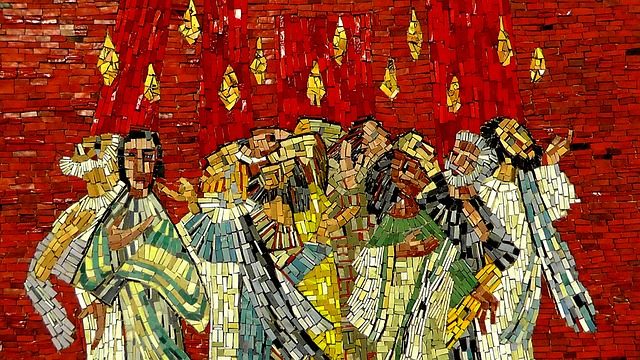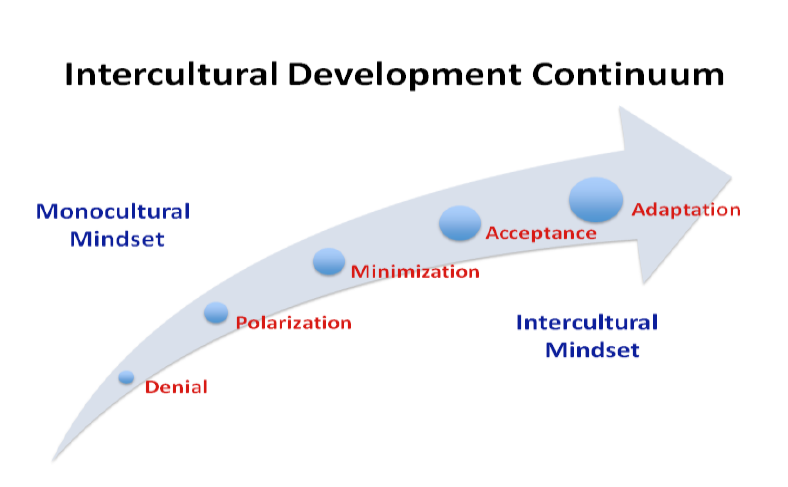Need resources? Click the toolbox above ⇑
Have more questions?
Contact Brittney Stephan, Associate Director for Multi-Cultural Vibrancy: [email protected]
Welcome
Cultural Vibrancy is a reality that we strive for when we are called to love our neighbors as ourselves. The goal of the Cultural Vibrancy team is to provide opportunities for learning, growth, and exploration as we pursue cultural development and understanding.
One very important tool that the Michigan Conference uses as an assessment of cultural understanding is the Intercultural Development Inventory (IDI).
What is the IDI?
The Intercultural Development Inventory is a 50-item questionnaire designed to assess intercultural competence. Intercultural competence is one's ability to shift cultural perspectives and appropriately adapt behavior in response to cultural diversity. There is no grade or perfect score, only a greater understanding of oneself, our organizations, and the work to be done.

Intercultural competence is essential to living and working with people from diverse cultures, and has been proven to be the key factor is fostering positive relationships between people of diverse cultures.
By taking these steps and using the resources provided on this page we are living into the attitudes and behaviors that reflect who we are called to be. The Cultural Vibrancy team is here for you every step of the way.
Learn more about the IDI here.
"The Intercultural Development Continuum (IDC TM) describes a set of knowledge/attitude/skill sets or orientations toward cultural difference".
Allow me to begin by emphasizing that no level is "Bad" or "Good". We all come from different backgrounds and experiences that contribute to the understanding we have. Through the IDI Assessment, the Cultural Vibrancy team aims to help us understand our developmental stages in order to be the people we want and need to be in order to create a healthier society.

Denial
A Denial mindset represents a limited experience with cultural difference, and thus a limited ability to understand cultural differences in values, beliefs, perceptions, emotional responses, and behaviors. Denial can consist of a disinterest in cultural differences and even an active avoidance of them. If you find yourself in this stage of development, take some time to reflect on ways you may be subconsciously harboring stereotypes and generalizations. Find more ways to reflect and grow with this resource page.
Polarization
Polarization is a mindset that views cultural differences from an “us versus them” perspective. Polarization can take the form of opinions like: “My cultural practices are superior to other cultural practices” or the reverse: “Other cultures are better than mine". Within the first point of view, cultural differences are often seen as divisive and threatening to one’s own “way of doing things.” The latter is a mindset that values and may idealize other cultural practices while denigrating one’s own culture group. Often seen in members of a marginalized culture, who seek to assimilate for the sake of avoiding retribution from the dominant group. Find ways to grow with this resource page.
Minimization
Minimization is a transitional mindset between the five different developmental stages. Someone with a Minimization mindset is able to recognize similarities between people, while still highlighting universal values and principles. These abilities are used by members of a dominant group and signify a limited cultural self-understanding. These same abilities can be used as a strategy that has survival value for non-dominant culture members and often takes the form of “go along to get along.” When Minimization exists in organizations, diversity often feels “not heard.” Find ways to grow with this resource page.
Acceptance
Having an Acceptance mindset allows individuals to recognize and appreciate patterns of cultural differences and similarities across cultures, including their own. A person at this developmental stage is curious to learn how a cultural pattern of behavior makes sense within different cultural contexts. This involves deep self-reflection of one’s own culturally learned perceptions, and the practices of different cultural groups. However, these individuals are not fully able to appropriately adapt to cultural difference. Individuals may often struggle with judging other cultures using the values and lens of their own culture as the objectively correct moral standard. Find more ways to grow with this resource page.
Adaptation
Adaptation is represented by changing behavior in authentic and culturally appropriate ways. A person at this developmental stage is able to enjoy deep cultural bridging across diverse communities. These individuals have experience navigating cultural similarities and differences. They may typically focus adaptive strategies, but can develop intolerance for people at other levels of the IDI continuum. Find ways to continue to learn and grow with this resource page.
In The Spirit of Lent
47 Days of Cultural Vibrancy
As we prepare to give up something for this season of lent, let us take up the daily practice of flexing our cultural vibrancy muscles. The Cultural Vibrancy Team has put together a calender with daily videos, quotes, and information to facilitate growth in intercultural competence. While we give up certain indulgences or unhealthy habits, this Lenten Calender will ensure we're using thay energy to stretch and improve our perspectives about the people with whom we share the world.
Beginning Feb 26th and concluding April 12th, follow along day by day with courage and resilience. Begin here.
Last Updated on October 30, 2023

